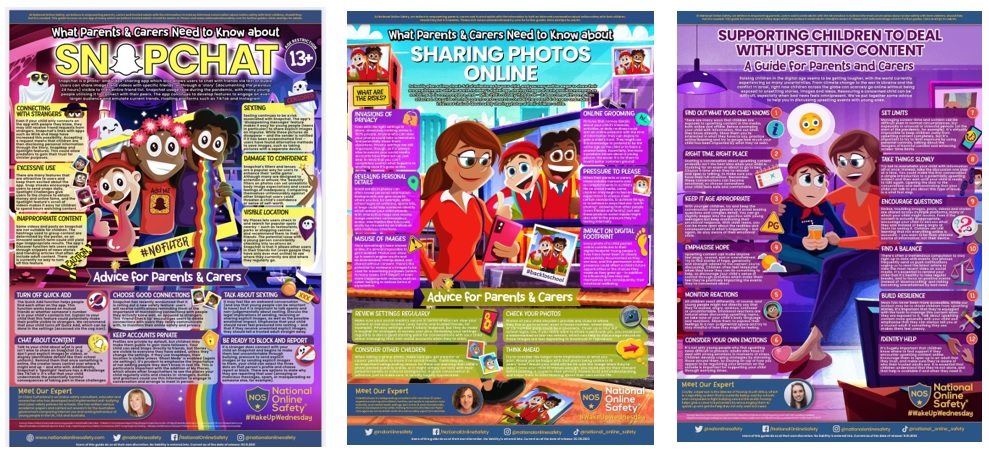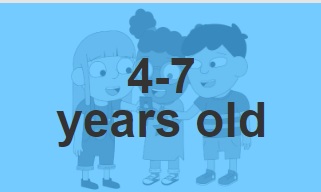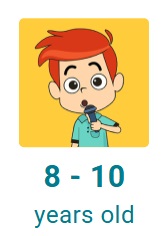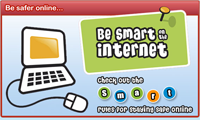Internet Safety
Technology is everywhere and will play a vital part in our children’s lives. It has become a main form of communication and most jobs will rely on technology in some way. You might be wondering whether what your children are doing online is safe, and you might also be thinking about how you can watch out for them.
At Hadrian Academy, online safety for our children is of paramount importance to us and is something that we monitor and revisit, especially in this ever-growing digital world.
Think U Know (4-7 year olds)
Suitable for children in Key Stage One, children can become familiar with Jessie and her friends Tia and Mo, which have been created by the CEOP.
Think U Know (8-10 year olds)
Suitable for children in Key Stage Two. Here you can learn e-safety by visiting this cool virtual Cyber Café. Visit it now to help Griff and his friends stay safe while using email, chat areas, mobiles and other new technologies!
|
CBBC offers a variety of ways to test your internet safety knowledge with Hacker, listen to some Stay Safe songs with Helen Skelton, News Kids On the Block and get some tips from the Horrible Histories gang.
Be Smart
Learn how to be smart whilst using the internet with Cyber Mentors. You can also go to Kidsmart with lots of videos and quizzes to test your knowledge.
Keeping Children Safe Online
We all have a vital role to play in keeping children safe online. This week, it has come to our attention that children are using a social media app called Snapchat. This app requires age verification and is not to be used by anyone under the age of 13. There are many other apps which should not be used by children of a primary age. This includes:
WhatsApp 16+
Facebook 13+
You Tube 18+
Instagram 13+
The internet provides new opportunities for children to learn and grow but it can also expose them to new types of risks.
E-Safety is an essential part of parents’ and schools’ safeguarding measures. It is important that we work together to educate every child about online safety and ensure they understand the dangers of the online world.
The following ‘SMART’ advice is a great tool to speak to your child about staying safe online:

Click here for more online safety advice. 
Parents may also find lots of useful advice by going to the NSPCC website using the link:
https://www.nspcc.org.uk/keeping-children-safe/online-safety/
We have included some additional tips for parents and households below:
E-SAFETY TIPS FOR PARENTS
General tips
- Keep computers in a family area, not in children’s bedrooms.
- Use ‘child lock’ or filter settings on your Web browser to help prevent unsuitable site access by your child.
- Regularly supervise the sites your child is visiting.
- Encourage your child to use their Favourites list to access the sites you have approved to prevent accidental entry to unsuitable sites.
- Discourage your child from using social Networking sites e.g. MSN, Facebook, Bebo etc. to keep them safe from cyber bullying.
- Teach your child to switch the monitor off or close the laptop lid, then fetch or tell you if something unsuitable appears on the screen. This is what we do in school.
- Agree with older children what sites they are allowed to access.
- Keep all personal details private and be aware of stranger danger.
- Above all, encourage your child to talk to you about the web sites and electronic devices they are using at home and school.
Surfing the internet.
- Treat your password like your toothbrush – keep it to yourself!
- Keep your home address, your phone number or email address off the internet, MSN and chat rooms.
- Learn to report someone who is behaving badly.
- Save the evidence – learn to save emails or on-line conversations.
- Don’t retaliate or reply.
- Always respect others – think carefully about what you are typing.
- Tell someone you trust if you see something that worries or upsets you.
- Remember what you have learned in school – use that at homes
Listed below is a link to child friendly search engine.











